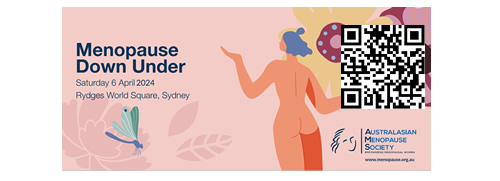The International Menopause Society welcomes the release of this study, published in the British Journal of Cancer, Menopausal hormone therapy and breast cancer: what is the true size of the increased risk? which reinforces the advice provided in our evidence based IMS Recommendations and in the recently published Global Consensus Statement.
Professor Rodney Baber, IMS President comments "This prospective Observational study has attempted to correct for risk of breast cancer associated with MHT use by updating user status at several points during the period of observation.
The study shows an increased risk of breast cancer (or preinvasive DCIS) for women using combined E+P MHT after more than 5 years of treatment and also that this risk increases with prolonged treatment
There was no increased risk of breast cancer seen for users of oestrogen only therapy.
This data is the same as that reported in the prospective RCT, The Women's Health Initiative, which also found no increased risk for oestrogen only MHT users and a small increase in absolute risk for users of combined MHT comprised of conjugated oestrogen's and medroxyprogesterone acetate.
This new observational study has not differentiated between the various combined MHT regimens nor between different progestogens used.
This is an important oversight as there is considerable evidence to suggest that certain synthetic progestins, such as medroxyprogesterone acetate, may increase breast cancer risk when used in combined MHT when compared to regimens in which micronised progesterone is used.
This new observational study reported no effect on risk for past users of MHT irrespective of the duration of use, and no difference for breast cancer hormone receptor status or morphological type"
Professor Baber concludes "This new observational study, with the best of intentions, remains an observational study with small numbers of breast cancer cases and dose not change our overall understanding of the relationship between MHT use and breast Cancer risk"
The IMS evidence based recommendations remain as listed below:
- The risk of breast cancer in women over 50 years associated with MHT is a complex Issue
- The increased risk of breast cancer is primarily associated with the addition of a synthetic progestogen to oestrogen therapy (CEE + MPA continuous combined therapy) and is related to duration of use.
- The risk may be lower with micronised progesterone or dydrogesterone than with a synthetic progestin.
- The risk of breast cancer attributable to MHT is small and the risk decreases progressively after treatment is stopped.
Comment ends
For general information on the International Menopause Society, see http://www.imsociety.org
For IMS recommendations on HRT, please see http://www.imsociety.org/ims_recommendations.php
Content updated 25 August 2016






